by M. C. Jennings | Jan 30, 2023 | Academics, COBA Faculty, COBA Staff, Faith Infusion, Uncategorized
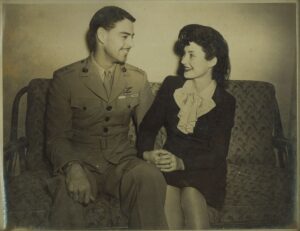
The late Dr. Bill and Janie Dukes have given, through their estate, more than $29 million to the College of Business – the largest single academic gift in ACU’s history.
Written by special contributor Lance Fleming
The lifeblood of any university – and individual colleges within the university – are donors. Alumni and friends of the university who generously give back to the place that has made a mark on their lives to enrich the next generation of leaders.
Abilene Christian University is no different. It was the hard work of the university’s founder and first president. A.B. Barret, who got Childers Classical Institute off the ground. He pounded the dirt roads of West Texas via horse and buggy in the winter and spring of 1906, raising money for his vision of a Christian university. He secured gifts from 195 individuals around Abilene for a grand total of $3,500. Not bad, considering that would now be worth more than $115,000 in 2022 money.
Those generous donors provided for expansion from Childers Classical Institute when it opened in 1906 to the current robust university. Childers started with 25 students in a single building. Today, the university serves more than 5,000 students and offers 79 undergraduate degree programs and more than 160 fields of study in numerous disciplines.
Every gift and every donor made a difference and helped Barret’s idea of a Christian university in Abilene become a reality. As ACU president Dr. Phil Schubert (’91) wrote in the case study for the university’s current capital campaign, Higher Ground, “I believe Barret, who was certainly a man with great vision, would have had difficulty imaging the national university ACU is today.”
Dr. Brad Crisp, the Dean of the College of Business Administration, has seen first-hand the impact donors make on campus and a specific college.
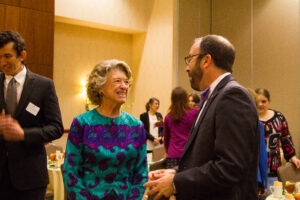
Ann Griggs Berger with accounting professor Dr. Clint Buck at the Ruth Allen Griggs Honor Luncheon.
“Simply put, donors make it all possible,” he said. “At the beginning of my time as dean, I remember a particular week when COBA received gifts from three women who had recently lost a loved one, a husband or a father. Because all three contributions came in the same week, it was hard for me to miss the impact that ACU and COBA had on each of those families.
“I realized that the gifts we receive often flow from experiences and relationships from a long time ago, rather than fundraising being something that drives donors now,” Crisp said. “People often assume that asking for money is scary or off-putting, but I find it’s an honor to talk with people about their passions. I like to find out what motivates them to give, and to help them find opportunities to support the students, faculty, staff, and alumni that mean so much to them.”
And now the university’s Higher Ground campaign is once again calling on those people and other friends of the university to push ACU to new heights in its second century of educating students for Christian service and leadership throughout the world. The $250 million campaign is, by far, the largest fundraising initiative ever undertaken by the university. It will transform the university in ways that Barret could never have foreseen.
The university has designated $118 million to “Enhance and Increase Transformational Experiences” and the other $132 million to “Strengthen and Elevate ACU’s Academic Profile.” COBA and the building it has called home for more than 35 years – the Mabee Business Building – are part of the Higher Ground campaign.
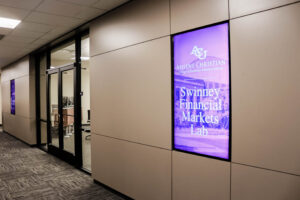
The new Swinney Financial Markets Lab gives students interested in careers in finance a state of the art classroom experience.
Preparing the next generation of students in COBA for the needs and technological advancements in the workforce was at the forefront of the renovations the building has undergone. Students and staff returned for the start of the 2022-23 school year to an updated classroom wing and reimagined learning spaces for students. A more advanced and visible finance lab will provide students with industry tools to practice real-life trading with faculty mentors at their sides, and an upgraded digital experience lab will add more room for this growing technology program.
But it’s not just giving to the physical brick-and-mortar spaces that make a difference in the lives of ACU students. Donors give to scholarship funds, helping attract more students to the university and, in particular, COBA, thanks to the Nicholson-Upp Endowed Scholarship, among others. Donors also provide their time and expertise to return to campus and share their knowledge with the next generation of business leaders.
“Donations come in many forms, and we would not be able to provide the professors, the facilities, or the transformative experiences without them,” said COBA Assistant Dean Tim Johnston. “We are fortunate that our alumni are generous people. Their generosity of time is also critical to our success. Alumni return to campus and share insights that help set students on a different career trajectory. Our alums help students understand what it takes to break into various career fields.
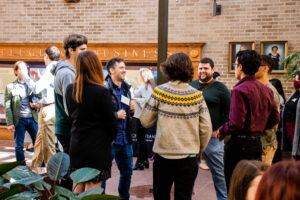
Members of COBA’s Visiting Committee network with students.
“The day-to-day performance of our alumni provides us with a great reputation of excellent workers who are a pleasure to work with,” Johnston said. “That opens the doors to exciting employment opportunities for our graduates.”
Jane Clark – Enrollment and Student Success Manager at COBA – said that connection is powerful in shedding light on how donors make a difference in the lives of students, faculty, and staff.
“The COBA difference at ACU is built on the foundation of strong connections,” Clark said. “Connections among our students, staff, faculty, and alumni. With the generosity of our alumni comes the strengthening of those relationships on our campus through fellowship, experiences, and opportunities. A student comes to ACU seeking a business or technology degree, but they graduate with so much more. We want to inspire, equip, and connect Christian business and technology professionals … with the vision and service of our students past, present, and future. That is so much more than an ACU COBA degree; it is the building of a legacy.”
It’s part of a legacy that began with A.B. Barret’s dream in 1906, a legacy that lives on today in all that exists thanks to the people who have believed in that dream.
by M. C. Jennings | Nov 2, 2022 | Academics, COBA Faculty, COBA Staff, College Decisions, Current Students, Faith Infusion, Professional Development, Uncategorized
Written by special contributor Lance Fleming
It only takes a few seconds of studying the mission of ACU’s College of Business Administration (COBA) to discern that the holistic development of its students is as important as anything else that goes on in the Mabee Business Building.
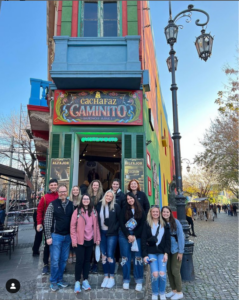
Dr. Andy Little and students during their Study Abroad trip to Montevideo last summer.
The first point of the mission statement is “holistic student learning and development.” That part of the mission goes on to say that ACU “seeks spiritual, academic, and professional growth over the life of each student through exemplary teaching, experiential learning, and relationships with Christian faculty, professional staff, and engaged alumni.”
It’s all part of equipping the next generation of global leaders with all the tools necessary to be successful in their homes, in their places of worship, in their communities, and in their places of work.
“While great teaching is essential to what we do, we want to emphasize how our students learn and develop both inside and outside the classroom,” said Dr. Brad Crisp, Dean of the College of Business Administration. “That is why we are partnering with the university in the design and implementation of the Compass initiative.”
The Compass initiative begins with a customized roadmap showing the key experiences the student can choose during their time at ACU. Then, they can utilize the Compass app or website to gain access to badges and activities that they can pursue at the appropriate times during their journey. The student will also have a record of their co-curricular experiences during their time at ACU and within COBA.
Crisp and Derran Reese – Director of Experiential Learning – presented this initiative at the Suitable conference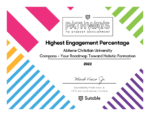
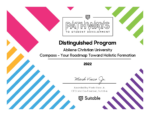 last summer in Philadelphia where ACU Compass won two awards: Highest Student Engagement (91% engagement rate) and The Distinguished Program Award. Suitable provides the technology platform supporting the Compass initiative. Reese said Compass was designed to help students engage in various activities and experiences that help them grow in various ways: intellectually, spiritually, professionally, etc.
last summer in Philadelphia where ACU Compass won two awards: Highest Student Engagement (91% engagement rate) and The Distinguished Program Award. Suitable provides the technology platform supporting the Compass initiative. Reese said Compass was designed to help students engage in various activities and experiences that help them grow in various ways: intellectually, spiritually, professionally, etc.
“We must think about creating an integrated student experience,” Reese said. “Designing curricular and co-curricular activities should be intentional, and we need to communicate to students that these activities all contribute to their holistic development. That is why we designed Compass.”
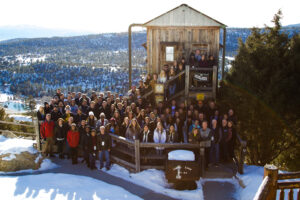
Leadership Summit 2020 attendees (a program of the Lytle Center for Faith and Leadership).
Compass, however, is about more than the teaching that goes on in the classroom. It is about merging different experiences into the classroom, engaging students in projects and internships, and providing opportunities for them to lead in student organizations, etc. It’s about bringing in speakers and employers, going on Study Abroad trips, and participating in the Griggs Center or Lytle Center. It’s not just what is done inside the classroom.
“We have a BBA badge for our pre-business students and are working on reformatting the professional development badge and including a Lytle Center badge,” said M.C. Jennings, Student Engagement and Marketing Manager for COBA. “We want students to be able to keep track of all of their accomplishments and have a portfolio that they will be able to share with future employers that show all of the things they were involved in (Study Abroad, speakers, special projects), holds their resume and cover letter, has academic accomplishments, etc. Eventually, we hope to have more class assignments tied to Compass through Canvas. This is a tool that will enable students to track their academic, professional, personal, and spiritual growth throughout their time at ACU.”
And all of this is part of the holistic learning environment being fostered in COBA, an environment that is necessary for students preparing to enter the world away from ACU.
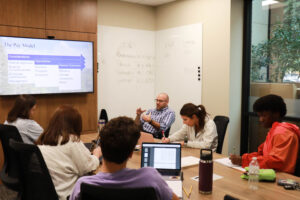
Dr. Matt Deeg takes students out of the regular classroom to learn about HR in a more interactive setting.
“Excellence is demanded of our graduates upon graduation,” said Tim Johnston, Assistant Dean of COBA. “Professors have the tough task of teaching to a high standard and evaluating a student’s ability to complete the assignments to standard. At ACU, our class size and Christian mission make the learning experience very personal. Striking the balance between objective assessment and personal care for an individual student is complex. Our professional development program and alumni connections help support the need for a student to achieve learning excellence.”
But, Reese said, that learning excellence must now include many different facets than might have been required even as few as five years ago.
“Today education is more holistic, and the responsibility of a university – particularly a Christian university – is to help form the whole student. That means that curriculum and pedagogy matter, and additional equipping of students with professional and life skills is vital. Expanding their awareness of diverse cultures and peoples, while developing the type of character that will enhance their careers and bless the world are challenges we address with focused intentionality.”
by M. C. Jennings | Oct 20, 2022 | Academics, Accounting, Alumni Spotlight, COBA Faculty, COBA Staff, Current Students, Digital Entertainment Technology, Financial Management, Human Resource Management, Management, Management Information Systems, Marketing, Placement stories, Professional Development, School of Information Technology and Computing, Uncategorized
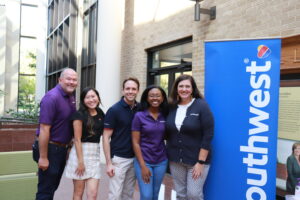
COBA Alums who work at Southwest Airlines recently came to discuss internship opportunities at the company with COBA students. Pictured from left to right are Chris Grubbs (’95), Kristy Ng (’20), Baron Smith (’09), Bethani Culpepper (’19), and Katie Coldwell (’00).
Written by special contributor Lance Fleming
When the College of Business Administration (COBA) unveiled the most significant changes to its curricula in decades, one area of great emphasis was professional development. Those studying the updates and later making the recommendations believed a professional internship would help make COBA students more well-rounded prospective employees when they left ACU.
As Dr. Brad Crisp, the Dean of the College of Business Administration said recently, “… we are placing greater emphasis on professional development by requiring a professional internship in management, marketing, and information systems and offering an internship as an option for accounting and finance majors.”
As the person serving as the director of professional development and internships for COBA, Jasmine McCabe-Gossett said the new emphasis on internships will help make students better equipped to handle real-world practices that they will face when they begin working full-time.
“Students need to take advantage of the unique timing internships can offer,” said McCabe-Gossett, who is in her first year as the Professional Development and Internship Director for COBA. “Students have the distinct opportunity to apply what can feel like abstract theories and case studies to the real world. Internships are insulated and allow students to practice in an environment designed for them to ask questions and fail, whereas, post-graduate opportunities can be far less forgiving.”
first year as the Professional Development and Internship Director for COBA. “Students have the distinct opportunity to apply what can feel like abstract theories and case studies to the real world. Internships are insulated and allow students to practice in an environment designed for them to ask questions and fail, whereas, post-graduate opportunities can be far less forgiving.”
Tim Johnston, the Assistant Dean for COBA, said a student who participates in an internship program in college will have a distinct advantage over students who don’t take advantage of those programs.
“Many years ago, with the contraction of the economy, many students were entering college without a lot of summer work experience,” Johnston said. “One of the top qualities all employers like to access is work ethic. Without a lot of work experience, it was difficult to feel confident about a student’s ability to dig-in and work hard. Many large organizations started internship programs.
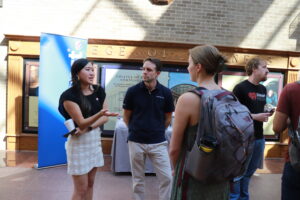
“These programs typically run for 12 weeks during the summer,” he said. “Most are paid and it’s a way for a company to have a long and intense look at the candidates. Many companies only offer full-time opportunities to those students who have completed an internship with their organization. So for many large firms, this is the path into their company.”
When a student is looking for an internship, COBA Associate Dean Andy Little said one thing stands above all when he advises a student on a potential position.
“Fit,” he said succinctly. “In other words, does this organization fit your values and the goals you have set for yourself? Will you get practical experience? What kind of people work there? Is it an industry or market segment that you would like to start your career in?”
McCabe-Gossett agrees that finding an internship in a potential career field is an essential part of finding the right landing spot.
“I encourage students to focus on finding an internship in the industry they imagine as their future career,” she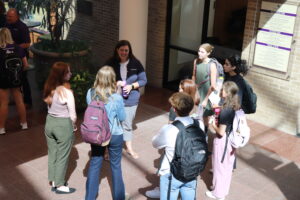 said. “Doing so will allow them to fully immerse themselves so they can determine whether or not their dream industry aligns with their values, work style, etc.”
said. “Doing so will allow them to fully immerse themselves so they can determine whether or not their dream industry aligns with their values, work style, etc.”
The National Association of Colleges and Employers has surveyed employers and determined the following qualities are most important to the potential employers surveyed. In order of importance, those qualities are:
- Problem-solving (critical thinking)
- Teamwork / collaboration
- Professionalism / work ethic
- Verbal and written communication skills
- Digital technology capabilities
- Leadership
- Global / multicultural fluency
“We want our students to demonstrate these competencies and reflect on their current areas of strength and areas where growth is needed,” Johnston said. “Their internship manager completes a formal evaluation that provides feedback on these key qualities.
“Another key advantage we are looking to provide for ACU students is an opportunity to intern with ACU alumni,” he said. “Our alumni teach students how professional excellence provides another avenue to honor God, as we serve in the marketplace.”
If you’d like to know more about internships with COBA, as either an employer or a student, email coba@acu.edu.
by M. C. Jennings | Oct 12, 2022 | Academics, Accounting, COBA Faculty, College Decisions, Current Students, Economics, Faith Infusion, Financial Management, Human Resource Management, International Business, Management, Management Information Systems, Marketing, Professional Development, Uncategorized
Written by special contributor Lance Fleming
The College of Business Administration (COBA) recently undertook what Dr. Brad Crisp considers “the most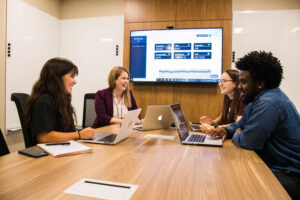 significant change to business curricula at ACU in at least three decades” with revisions to the Bachelor of Business Administration (BBA) majors.
significant change to business curricula at ACU in at least three decades” with revisions to the Bachelor of Business Administration (BBA) majors.
Those changes include updates to the core requirements for all business majors and to the major requirements for each business major, including an analytics track available within each major. The process that was undertaken was extensive and lasted a few years, including input from the COBA Dean’s Council, Visiting Committees, and other external stakeholders.
The members of each of those committees and groups were looking at in-depth benchmarking, analysis, and solution alternatives identified by the BBA Task Force. Those committees undertook extensive discussions on a wide range of proposals from the faculty task force, which was formed in early 2019 and delivered its recommendations later that fall. After the committees did their work, the changes were approved last spring by faculty and administrators at all levels of the university.
The goal of the core revision largely focused on faith and ethics, analytics and technology, and professional development.
“Faith and ethics are central to our identity as a Christian university,” said Dr. Crisp, the Dean of the College of Business Administration, “and we added some ethics content to a required business law course. All business majors will now take a two-course sequence in analytics and can choose a nine-hour or more track in analytics. Finally, we are placing greater emphasis on professional development by requiring a professional internship in management, marketing, and information systems and offering an internship as an option for accounting and finance majors.”

Photo by Jeremy Enlow
Those recommendations and changes are part of COBA keeping up with the pace of change that is currently being seen in the business world, said Andy Little, associate dean for COBA and associate professor of Business Law.
“The pace of change in the business world – and society in general – necessitates some level of change in two dimensions: first within a specific course, faculty need to stay up to date with new developments; and second, from time to time, the curriculum in general needs to be evaluated and potentially updated,” Little said. “It’s easy for most faculty to update specific courses on a regular basis. I’ve added three new readings to my introductory law class, all of which deal with recent developments in the legislature.
“Maybe more clearly, a course like Digital Marketing requires near-constant revision, just to keep up with all the changes in how people and companies use platforms to market products and services,” he said. “To a certain extent, the velocity of change works in favor of a stable curriculum: foundational subjects like Accounting, Economics, and Statistics need to be included in every iteration of a core curriculum over time because those are the building blocks on which much of the business enterprise rests.”
Every major was reviewed and now has more market aligned pathways giving students more direction and professional guidance as they look toward their future profession. As the business world evolves, COBA is continually looking for ways to prepare students both inside and outside of the classroom. We do this through holistic student development, offering foundational business courses and major specific tracks, and including ethics in our offerings. This combination helps us strive to produce graduates who honor God and bless the world.
To learn more about the College of Business at ACU, click here.
by M. C. Jennings | Sep 28, 2022 | Academics, Alumni Spotlight, COBA Events, COBA Faculty, COBA Staff, Current Students, Faith Infusion, Uncategorized
Written by special contributor Lance Fleming
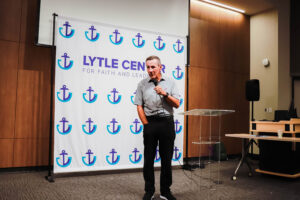 In more than 30 years as the minister at The Hills Church in North Richland Hills, Rick Atchley (’78) has delivered thousands of sermons to millions of people, drawing listeners from near and far to a relationship with Jesus Christ. In Atchley’s tenure with The Hills Church, it has grown to be among the largest Church of Christ congregations in the world, averaging over 5,000 in attendance each week across three campuses.
In more than 30 years as the minister at The Hills Church in North Richland Hills, Rick Atchley (’78) has delivered thousands of sermons to millions of people, drawing listeners from near and far to a relationship with Jesus Christ. In Atchley’s tenure with The Hills Church, it has grown to be among the largest Church of Christ congregations in the world, averaging over 5,000 in attendance each week across three campuses.
As he said when he was named ACU’s Outstanding Alumnus of the Year in 2014, one of the themes of his life and his ministry is to live out Christ’s call to unify and to “bring down walls that God didn’t want up in the first place.”
Atchley spoke to both students and faculty and staff at ACU on Tuesday, September 6th. His address to students was a part of the Lytle Center’s Fall Speaker Series while his exhortation to faculty and staff was a part of the Lytle Center’s second annual Abiding in Christ dinner event. The Abiding in Christ dinner was established in 2021 with a vision of encouraging and challenging faculty and staff in the deepening of their relationships with Jesus in order to better influence and serve students. It should come as no surprise that Atchley had a challenge for each group. A mission to follow Christ no matter the setting or circumstances.
students was a part of the Lytle Center’s Fall Speaker Series while his exhortation to faculty and staff was a part of the Lytle Center’s second annual Abiding in Christ dinner event. The Abiding in Christ dinner was established in 2021 with a vision of encouraging and challenging faculty and staff in the deepening of their relationships with Jesus in order to better influence and serve students. It should come as no surprise that Atchley had a challenge for each group. A mission to follow Christ no matter the setting or circumstances.
At the Abiding in Christ dinner, Atchley contended, that ACU should be a place where students attend to not only grow in academic ability but also in wisdom.
“We know there’s a difference between being intelligent and truly being wise, and that’s why I believe the mission of this university is so critical,” he said to a group of around 200 faculty and staff members gathered in the Brown Family Club Level at Anthony Field at Wildcat Stadium. “Let’s be honest: young people don’t have to come to ACU to gain knowledge on how to be an accountant or how to manage the market. They can gain knowledge at many great universities. What I hope for when they come here is that, along with knowledge, they gain wisdom. They learn to be wise, not just smart.”
Atchley then spent several minutes challenging those in attendance to teach their students to look for wisdom and guidance from above and not from other sources.
“What is the wisdom of the world?” he asked. “It’s the knowledge that looks for truth from within instead of above. It’s the Kool-Aid of this culture. The young people you teach have been immersed in it. It’s all about finding their truth. The world has told them to look inside to find truth.”
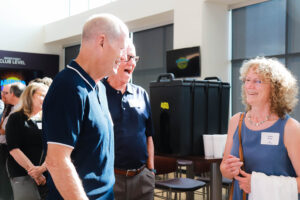 “They don’t have to come here to get knowledge; you’re good at that,” Atchley told the crowd. “You’re good at that. But when they leave with the knowledge you’ve given them, will they be wiser? Will they leave with a worldview that says ‘I’m going to look at life through the lens of the wisdom of Christ? He will be where I get my truth. He will be the framework from which I understand what is right and wrong.’ Will they leave with wisdom, not just knowledge?”
“They don’t have to come here to get knowledge; you’re good at that,” Atchley told the crowd. “You’re good at that. But when they leave with the knowledge you’ve given them, will they be wiser? Will they leave with a worldview that says ‘I’m going to look at life through the lens of the wisdom of Christ? He will be where I get my truth. He will be the framework from which I understand what is right and wrong.’ Will they leave with wisdom, not just knowledge?”
Late in his address to the faculty and staff, Atchley reminded them that they are working and teaching in a society that has been battered by the constant battle between politics and religion. And it’s against that backdrop that ACU faculty and staff must equip students with the wisdom needed to traverse that world, no matter their chosen profession.
“For the Christian educator, the opportunity to prepare students for the world in which they will pursue varied and creative careers must include the role of faith and the pursuit of wisdom,” said Mitzi Adams, Director of Clinical Teaching and Field Experiences in the Department of Teacher Education. “We are challenged to consider how our courses are different from the courses offered at other prestigious universities where students could secure a solid education. At ACU, it must come back to the witness of faith.”
“I think it’s very important for students to hear and experience much more than just knowledge of their field of study,” she said. “At a Christian university, the faith we profess becomes the framework through which we view and experience this education.”
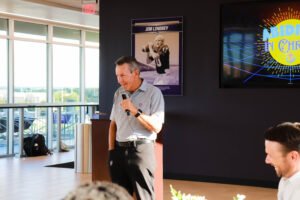 As Atchley pointed out numerous times to the faculty and staff, the prevailing mission of ACU should be to not only equip students with knowledge and wisdom but also the desire to live out their faith in the world around them.
As Atchley pointed out numerous times to the faculty and staff, the prevailing mission of ACU should be to not only equip students with knowledge and wisdom but also the desire to live out their faith in the world around them.
“For a student to walk away from this Christian university without the opportunity to understand and apply where and how faith integrates into their chosen field of study is to have had an important aspect of this education withheld,” Adams said. “If not now, when will our students have the opportunity to be immersed in studies intended to prepare them for excellence in their field? Beyond this, at what other time in the lives of our students will they have the opportunity to be taught by exceptional practitioners, academics, and researchers who are compelled by the Christian faith? Our students are here now. This is an opportunity we have as a faculty to pour into our students not only our professional expertise but also the centering of our faith.”
Before Atchley spoke to the faculty and staff at the football stadium, he met with COBA students, challenging them to choose the battles that matter.
“It’s easy to get passionate and carried away with matters that don’t have much weight,” said Kathryn Crawford, a senior Finance and Management major from Flower Mound. “Instead, we need to recognize the fights that will have an impactful outcome and approach those with our chosen values.”
In addition, his theme with the students was much the same as it would be later with the faculty and staff: that knowledge is easily attainable anywhere but it’s wisdom and obedience in Christ that will make the most impact on the world.
“He made the point that we have to trust the impact of an obedient life,” Crawford said of Atchley. “When things become difficult, the easy way out seems so attractive. But this path does not guarantee obedience. Time and time again, scripture shows us our convictions will cause us to face difficult things in our lives. Choosing obedience may not be easy but the impact we can unknowingly have on the Kingdom is far greater than the temporary adversity we might face.”
Crawford said Atchley’s message to students about integrity and faith in the workplace resonated with her because he put special emphasis on how important the choice will be.
“As a student at a Christian university, it becomes easy to rely on circumstances and surroundings to motivate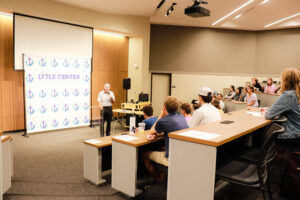 my faith,” she said. “However, I know this won’t necessarily be the case when I emerge into the workforce as a young professional. I value my faith deeply but have not been in many environments that challenge or counter my beliefs. I left the message feeling encouraged to stay true to my values regardless of circumstance and recognize how much of a difference it can truly make if I choose to let it.”
my faith,” she said. “However, I know this won’t necessarily be the case when I emerge into the workforce as a young professional. I value my faith deeply but have not been in many environments that challenge or counter my beliefs. I left the message feeling encouraged to stay true to my values regardless of circumstance and recognize how much of a difference it can truly make if I choose to let it.”
The Lytle Center for Faith and Leadership exists to foster environments for individuals to grow in faith and character, equipping them with cutting edge leadership competencies, and developing them to be ambassadors of hope, peace, and life in their workplaces. The Lytle Center Speaker Series and the annual Abiding in Christ dinner events are just one example of the ways the Lytle Center strives to encourage and equip the students, faculty, and staff at Abilene Christian University. More information about the Lytle Center can be found by clicking here.
by M. C. Jennings | Sep 6, 2022 | Academics, COBA Faculty, College Decisions, Faculty Testimonials, Faith Infusion, Management Information Systems, Uncategorized
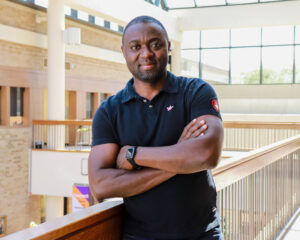 Written by special contributor Lance Fleming
Written by special contributor Lance Fleming
Growing up in Cameroon as the oldest child in a family of five, Dr. Joseph Manga never imagined where his life would take him.
Four different universities for undergraduate, graduate, and doctoral work, as well as tutoring and teaching experience, have all been part of the experience. And this past summer, it led him to Abilene Christian University and the College of Business Administration where he is teaching Management Information Systems.
Manga now joins the full-time faculty as a tenure-track assistant professor of Information
Systems and Management Science. None of this was what Manga expected to be his life’s work
while living in Cameroon. But as he would come to learn, God had other plans for his life.
“As we know, many may be the plans in a man’s heart, but the Lord determines the end,” he
continued. “I began with Mathematics, did a little bit of Computer Science, and then moved on
to business (MIS). This all worked out because I didn’t just want to be crunching numbers and
not know how to interpret them. So, I developed my love for learning from my personal
experience. As an introvert, I thought that doing something that would keep me from talking to
people would be great. That’s why I’m so passionate about research. That was all my plan. But
God’s plan was to send me to love and talk to people.”
Knowing all of that, it still took a chance conversation with a friend that pointed him toward
teaching and meeting the needs of young people.
“I vividly remember sometime in 1998 a friend walked up to me and said, ‘I see you as a
teacher,’ “ Manga said. “I didn’t want to hear that because I never wanted to teach, partly
because of my personality. But as I applied myself to learning, I realized there is more to
teaching than just transferring knowledge. It involves mentoring and discipleship, which are
godly assignments that we are called to fulfill. I believe that teaching brings transformation to
many when it is done in a godly way. That’s why I’m excited to be part of a family and
community that focus on raising a holistic generation in terms of spiritual academic formation,
who will, in turn, move on to serve and transform their world.”
He’s also motivated by the memory of his father, who passed away last January. Manga is the
first person in his family to attain a doctorate, and he attributes his decision to reach the
highest level of education to his father, who worked as a janitor at the university Manga
attended in Cameroon.
“My dad was a strong motivator and proponent for pursuing education, which is a passion for
me now – to see young people educated,” Manga said. “As a janitor, my dad would wake up
very early to go clean the classrooms before students started classes. I still remember one
instance when my dad’s supervisor verbally demeaned him, and I felt bad. But I decided to get
to the highest level of education and use it to honor the janitors who keep our work
environment clean. It was an awful life experience, but it served as a challenge to the
educational experience I have today, which I see as a blessing.”
Manga earned his Bachelor of Science from the University of Buea in Cameroon before earning a
Master’s of Business Administration from Midwestern State University in 2014, a Master of
Science in Management Information Systems from the University of North Texas in 2018, and
finally his Ph.D., in Business Administration from the University of Texas-Rio Grande Valley in
2022.
During all of his academic work, Manga has continued his research in several different areas of
management information systems, technology, information security policy compliance,
business analytics, health information technology, cyber security, and many others.
“Research is a passion,” Manga said. It’s one way to apply my background knowledge in
Mathematics, which is problem-solving. Identifying problems and looking for ways to provide
solutions to these problems is what drives me into research. Finally, I see research as making a
little contribution to academia and giving back to the community.”
Manga has also worked as a Men’s Ministry Coordinator at Abundant Grace Community Church
in Edinburg and as a tutor while in Wichita Falls. And he’s kept up with a family that includes
wife Clarise and four children: Abijoy (9), Solien-Pearl (6), Zoe-Ann (5), and Joe-Praise (4), all of
whom he calls “inquisitive disciples.”
And now the family of six has found its way to Abilene and ACU where Manga is ready and
willing to serve as God leads.
“I am passionate to serve, especially in an environment that aligns with one’s beliefs and
values,” he said. “When the opportunity opened to be part of a culture and institution that
trains godly business leaders in whatever capacity they find themselves, I was glad to jump on
it. God opened this door and I love to follow His lead.”






 last summer in Philadelphia where ACU Compass won two awards: Highest Student Engagement (91% engagement rate) and The Distinguished Program Award. Suitable provides the technology platform supporting the Compass initiative. Reese said Compass was designed to help students engage in various activities and experiences that help them grow in various ways: intellectually, spiritually, professionally, etc.
last summer in Philadelphia where ACU Compass won two awards: Highest Student Engagement (91% engagement rate) and The Distinguished Program Award. Suitable provides the technology platform supporting the Compass initiative. Reese said Compass was designed to help students engage in various activities and experiences that help them grow in various ways: intellectually, spiritually, professionally, etc. 


 first year as the Professional Development and Internship Director for COBA. “Students have the distinct opportunity to apply what can feel like abstract theories and case studies to the real world. Internships are insulated and allow students to practice in an environment designed for them to ask questions and fail, whereas, post-graduate opportunities can be far less forgiving.”
first year as the Professional Development and Internship Director for COBA. “Students have the distinct opportunity to apply what can feel like abstract theories and case studies to the real world. Internships are insulated and allow students to practice in an environment designed for them to ask questions and fail, whereas, post-graduate opportunities can be far less forgiving.”
 said. “Doing so will allow them to fully immerse themselves so they can determine whether or not their dream industry aligns with their values, work style, etc.”
said. “Doing so will allow them to fully immerse themselves so they can determine whether or not their dream industry aligns with their values, work style, etc.” significant change to business curricula at ACU in at least three decades” with revisions to the Bachelor of Business Administration (BBA) majors.
significant change to business curricula at ACU in at least three decades” with revisions to the Bachelor of Business Administration (BBA) majors.
 In more than 30 years as the minister at The Hills Church in North Richland Hills, Rick Atchley (’78) has delivered thousands of sermons to millions of people, drawing listeners from near and far to a relationship with Jesus Christ. In Atchley’s tenure with The Hills Church, it has grown to be among the largest Church of Christ congregations in the world, averaging over 5,000 in attendance each week across three campuses.
In more than 30 years as the minister at The Hills Church in North Richland Hills, Rick Atchley (’78) has delivered thousands of sermons to millions of people, drawing listeners from near and far to a relationship with Jesus Christ. In Atchley’s tenure with The Hills Church, it has grown to be among the largest Church of Christ congregations in the world, averaging over 5,000 in attendance each week across three campuses. students was a part of the Lytle Center’s Fall Speaker Series while his exhortation to faculty and staff was a part of the Lytle Center’s second annual Abiding in Christ dinner event. The Abiding in Christ dinner was established in 2021 with a vision of encouraging and challenging faculty and staff in the deepening of their relationships with Jesus in order to better influence and serve students. It should come as no surprise that Atchley had a challenge for each group. A mission to follow Christ no matter the setting or circumstances.
students was a part of the Lytle Center’s Fall Speaker Series while his exhortation to faculty and staff was a part of the Lytle Center’s second annual Abiding in Christ dinner event. The Abiding in Christ dinner was established in 2021 with a vision of encouraging and challenging faculty and staff in the deepening of their relationships with Jesus in order to better influence and serve students. It should come as no surprise that Atchley had a challenge for each group. A mission to follow Christ no matter the setting or circumstances. “They don’t have to come here to get knowledge; you’re good at that,” Atchley told the crowd. “You’re good at that. But when they leave with the knowledge you’ve given them, will they be wiser? Will they leave with a worldview that says ‘I’m going to look at life through the lens of the wisdom of Christ? He will be where I get my truth. He will be the framework from which I understand what is right and wrong.’ Will they leave with wisdom, not just knowledge?”
“They don’t have to come here to get knowledge; you’re good at that,” Atchley told the crowd. “You’re good at that. But when they leave with the knowledge you’ve given them, will they be wiser? Will they leave with a worldview that says ‘I’m going to look at life through the lens of the wisdom of Christ? He will be where I get my truth. He will be the framework from which I understand what is right and wrong.’ Will they leave with wisdom, not just knowledge?” As Atchley pointed out numerous times to the faculty and staff, the prevailing mission of ACU should be to not only equip students with knowledge and wisdom but also the desire to live out their faith in the world around them.
As Atchley pointed out numerous times to the faculty and staff, the prevailing mission of ACU should be to not only equip students with knowledge and wisdom but also the desire to live out their faith in the world around them. my faith,” she said. “However, I know this won’t necessarily be the case when I emerge into the workforce as a young professional. I value my faith deeply but have not been in many environments that challenge or counter my beliefs. I left the message feeling encouraged to stay true to my values regardless of circumstance and recognize how much of a difference it can truly make if I choose to let it.”
my faith,” she said. “However, I know this won’t necessarily be the case when I emerge into the workforce as a young professional. I value my faith deeply but have not been in many environments that challenge or counter my beliefs. I left the message feeling encouraged to stay true to my values regardless of circumstance and recognize how much of a difference it can truly make if I choose to let it.” Written by special contributor Lance Fleming
Written by special contributor Lance Fleming